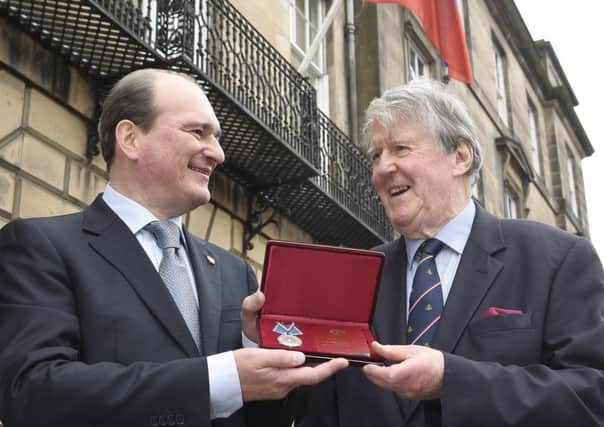Scottish Arctic convoy veterans hailed as heroes by Russian diplomat


Now, to commemorate the 75th anniversary of the first convoys departing from Wester Ross, every Arctic convoy veteran in Scotland is to receive a book specially-commissioned by Andrey Pritsepov, the Russian consul-general in Scotland, in which veterans describe their memories of the convoys to Murmansk and Archangel.
The journey was described by Winston Churchill as the “worst journey in the world”
Advertisement
Hide AdAdvertisement
Hide AdThe men will be presented with Cold Seas And Warm Friendships at a ceremony on board the Royal Yacht Britannia on 30 August.
Describing the high regard in which the veterans are held in Russia, where 22 million people were killed in the war, Pritsepov said: “Everything connected with the war is very much vivid with the Russian people. The Arctic convoys are an integral part of this memory. These men are regarded as war heroes.”
Pritsepov commissioned the book, written by Commander Dairmid Gunn, as a lasting legacy to the veterans after he travelled throughout Scotland presenting the Ushakov Medal, one of Russia’s highest military honours for courage in sea warfare, to veterans and being greatly impressed by their remarkable stories.
“I was humbled by their modesty. The common feature among them was dignity. Each was an individual, some had a sense of humour and others were more subdued in their telling. They talked quite openly about what they had been through. How they managed to be human beings afterwards and survived the challenge, physically and mentally.
“They were very vigilant – you can see it in their eyes – when they remembered those days their eyes lit up. I compared them to one of Hemingway’s characters – The Old Man And The Sea.”
There are now just under 150 such veterans in Scotland.
George McMillan from Glasgow, a radar operator on HMS Opportune, took part in one of the most important sea battles of the Second World War – the sinking of the German cruiser Scharnhorst, a constant threat to the convoys.
The Scharnhorst’s radar had been damaged and McMillan remembers “the German gun crews, confused by the absence of radar coverage, were firing randomly into the air against the non-existent air threat.”
McMillan also remembered German U-boat submariners forced to surface due to being depth-charged ditching binoculars and wristwatches in the sea as a final act of defiance.
Advertisement
Hide AdAdvertisement
Hide AdDavid Craig from Kilmarnock, a radio officer on the SS Dover Hill, recalled a Russian explosives disposal expert tackling an unexploded German bomb which had landed on the ship.
“I was standing beside the bomb with two of my fellow officers as the Russian expert started to unscrew the retainer ring of the detonator and primer… I felt the hair on the back of my neck standing up against the hood of my duffle coat.”